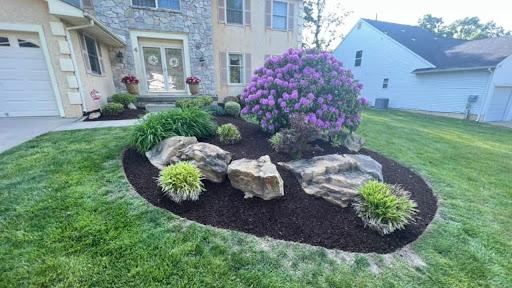BLOGS

What Are The Key Benefits Of Native Plants In Landscaping?
The key benefits of native plants in landscaping include their ability to thrive in local soil and climate conditions, which reduces the need for extra water and maintenance. They support local wildlife by providing food and habitat, and they help prevent soil erosion. Native plants also contribute to biodiversity and are often more resilient to pests and diseases.
Landscaping with native plants is becoming increasingly popular due to its numerous benefits for both the environment and property owners. These plants, naturally adapted to their local climate, offer a sustainable approach to gardening that supports biodiversity, reduces maintenance costs, and enhances the aesthetic appeal of outdoor spaces.
Freedom Landscaping, New Jersey's premier landscaping company, understands the importance of incorporating native plants into your garden. Established in 2020 by Connor Hughes, Freedom Landscaping brings innovative landscaping solutions to Sicklerville and surrounding areas, embodying their slogan: "Nothing Beats Freedom."
Key Takeaways
Ecological Benefits: Supports local wildlife, improves soil health, and attracts pollinators.
Economic Benefits: Reduces maintenance costs, conserves water, and is cost-effective over time.
Aesthetic Benefits: Enhances natural beauty, provides seasonal interest, and reflects cultural heritage.
Climate Resilience: Mitigates climate change and reduces urban heat.
Ecological Advantages of Native Plants
Native plants are essential for maintaining healthy local ecosystems. They provide critical habitats and food sources for a variety of wildlife, including birds, butterflies, and beneficial insects. By supporting these species, native plants help sustain a balanced food web, which is crucial for ecosystem stability. These plants have co-evolved with local fauna, meaning they are specifically suited to meet the needs of native wildlife. Additionally, native plants improve soil health through their extensive root systems. These roots help to stabilize soil, reduce erosion, and enhance water infiltration. This can significantly mitigate issues such as flooding and runoff, making native plants an invaluable asset to any garden.
Key Points:
Support for Wildlife: Essential habitats and food for birds, butterflies, and insects.
Soil Health: Deep roots stabilize soil, reduce erosion, and improve water infiltration.
Balanced Ecosystems: Co-evolution with local species helps maintain ecosystem stability.
Economic Benefits of Choosing Native Plants
Incorporating native plants into your landscaping can lead to significant cost savings over time. Once established, these plants require minimal maintenance, including less frequent watering, fertilizing, and pesticide applications. This reduces the overall costs associated with garden upkeep. Native plants are well-adapted to local climate conditions, which makes them more drought-resistant and less dependent on irrigation. This not only conserves water but also lowers water bills. Furthermore, reduced need for chemical treatments minimizes environmental impact and lowers maintenance costs, making native plants a financially savvy choice for any garden.
Key Points:
Low Maintenance: Less frequent watering, fertilizing, and pesticides.
Water Conservation: Drought-resistant, reducing irrigation needs and water bills.
Cost-Effective: Reduced maintenance and chemical use lead to long-term savings.
Aesthetic Appeal of Native Plants
Native plants add diverse colors, textures, and forms to your garden, enhancing its visual appeal. They can be used to create unique and beautiful landscapes that reflect the local environment, from vibrant wildflower meadows to serene woodland settings. Many native species offer seasonal changes in color and texture, adding dynamic beauty throughout the year. Incorporating these plants also connects your landscaping to the cultural and historical heritage of your region, adding depth and significance to your outdoor space. This connection not only beautifies your garden but also enriches it with a sense of place and history.
Key Points:
Diverse Beauty: Range of colors, textures, and forms.
Seasonal Interest: Dynamic changes in color and texture throughout the year.
Cultural Connection: Reflects local heritage and history in garden design.
Climate Resilience and Native Plants
Native plants play a crucial role in climate resilience by sequestering carbon dioxide, which helps to mitigate climate change. They also reduce the reliance on gas-powered lawn maintenance equipment, thereby lowering air pollution. In urban areas, native vegetation provides shade and releases moisture into the atmosphere, which helps to reduce temperatures and counteract the urban heat island effect. This creates a more comfortable environment and contributes to the overall reduction of heat in cities. By integrating native plants into your landscaping, you support environmental sustainability and enhance your garden’s ability to adapt to climate changes.
Key Points:
Climate Mitigation: Sequesters carbon dioxide and reduces air pollution.
Urban Heat Reduction: Provides shade and moisture to lower temperatures.
Sustainability: Supports environmental resilience and adaptation to climate changes.
Maintenance Requirements for Native Plants
Native plants generally require less maintenance than exotic plants, making them a practical choice for many landscapes. Once established, native plants are well-adapted to the local climate, soil conditions, and seasonal changes, which reduces the need for extensive care. These plants often have deeper root systems that enhance their drought tolerance, meaning they require less frequent watering compared to non-native species. Additionally, native plants typically need fewer fertilizers and pesticides because they are more resistant to local pests and diseases. Their natural resilience also means they can better withstand environmental stresses like heat and cold, further reducing the time and effort needed for upkeep.
Key Points:
Reduced Watering: Adapted to local rainfall, requiring less irrigation.
Lower Fertilizer Needs: Naturally suited to local soil conditions, minimizing fertilizer use.
Fewer Pesticides: Greater resistance to local pests and diseases.
Drought Tolerance: Deep root systems support reduced watering needs.
Maintenance Requirements for Exotic Plants
Exotic plants, or non-native species, often demand more intensive maintenance due to their lack of adaptation to local conditions. These plants might require frequent watering to compensate for their lower drought tolerance and may need regular fertilization to thrive in unfamiliar soil environments. Exotic plants can also be more susceptible to local pests and diseases, which may necessitate additional pesticide applications. Furthermore, they may not always handle extreme weather conditions as well as native plants, potentially requiring extra care and protection during temperature fluctuations or harsh environmental conditions. Overall, the upkeep of exotic plants tends to be more resource-intensive and laborious.
Key Points:
Increased Watering: Higher irrigation needs due to lower drought tolerance.
Regular Fertilization: May need frequent fertilizing to thrive.
Pest and Disease Management: Greater susceptibility to local pests and diseases.
Weather Sensitivity: More prone to damage from extreme weather conditions.
FAQs
What are native plants? Native plants are species that naturally occur in a particular region and have adapted to the local climate and soil conditions.
Why are native plants better for landscaping? They require less water, fertilizer, and maintenance, support local wildlife, and are better adapted to the local environment.
How do native plants benefit local wildlife? They provide essential food and habitat for native animals, including pollinators, birds, and beneficial insects.
Can native plants save me money? Yes, they typically require less maintenance and water, leading to reduced costs over time.
Are native plants suitable for all types of gardens? Native plants can be used in various garden styles, including wildflower meadows, woodland settings, and more, depending on the local species available.
Enhance Your Landscape with Native Plants – Freedom Landscaping
Incorporating native plants into your landscaping not only supports local ecosystems but also offers significant economic and aesthetic benefits. At Freedom Landscaping, we are committed to bringing these advantages to your outdoor spaces in Sicklerville and beyond. Our expertise in using native plants ensures that your garden will be both beautiful and sustainable. For a landscape that reflects the natural beauty of New Jersey while saving you time and money, trust Freedom Landscaping to transform your outdoor space.
Contact us now for a free quote and let us show you how native plants can transform your landscape. Get in touch with Freedom Landscaping today and experience the freedom of a beautiful, low-maintenance garden!
Ready To Give Your Property The Love It Deserves?
Whether it is keeping your lawn professionally maintained or completely re-vamping the look of your landscape, let our team of professional landscapers at Freedom Landscaping take your property to a whole new level!
Contact Us
Mon - Sat: 7:00 am - 6:00 pm
Sunday: Closed
© 2026 Freedom Landscaping LLC. All Rights Reserved. Privacy Policy. Terms & Conditions. Web Design By Fused Media.


